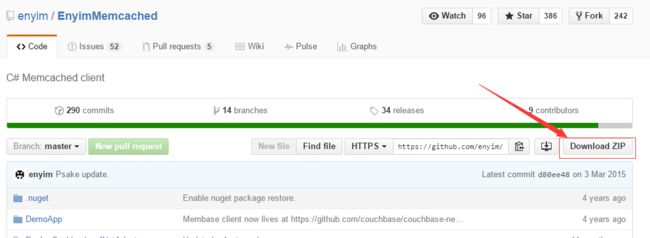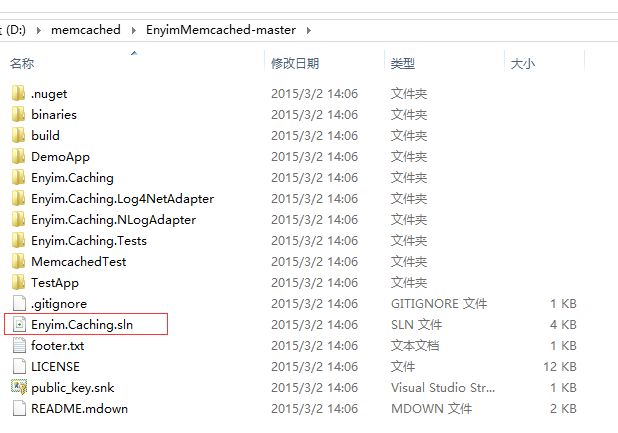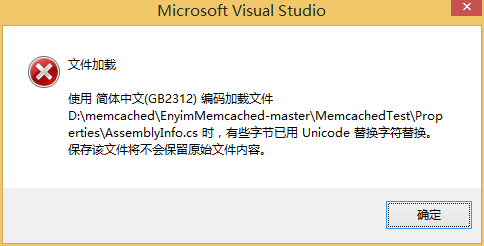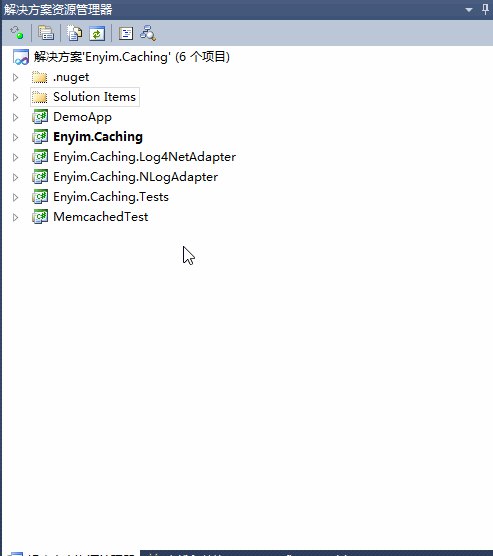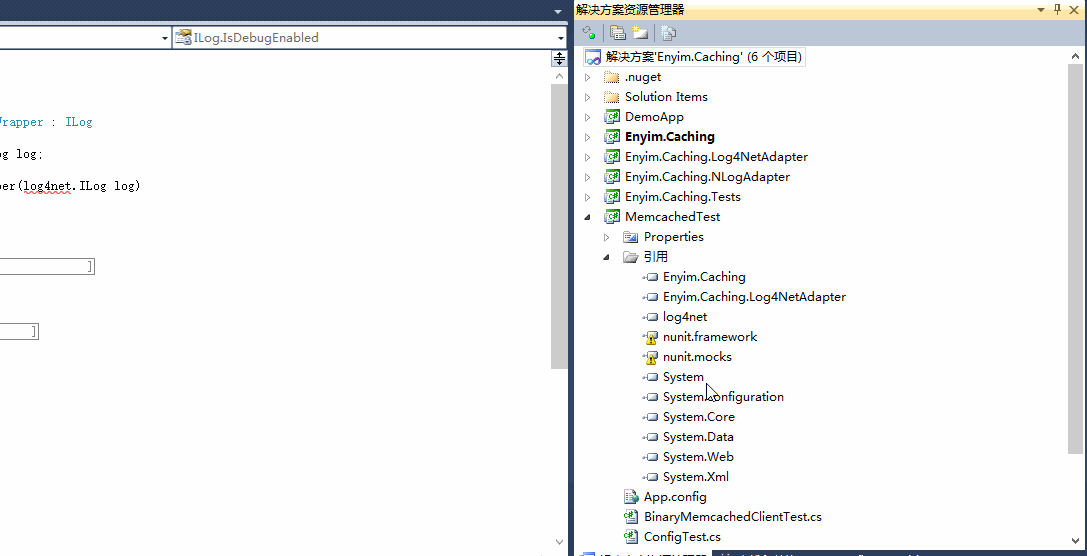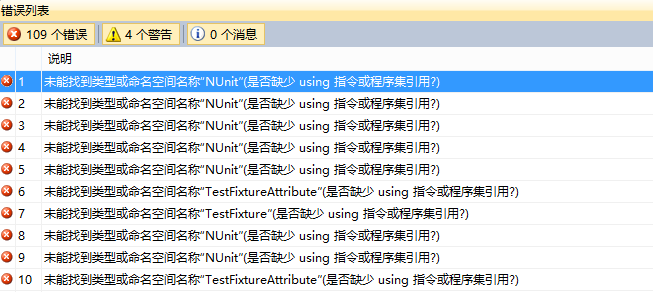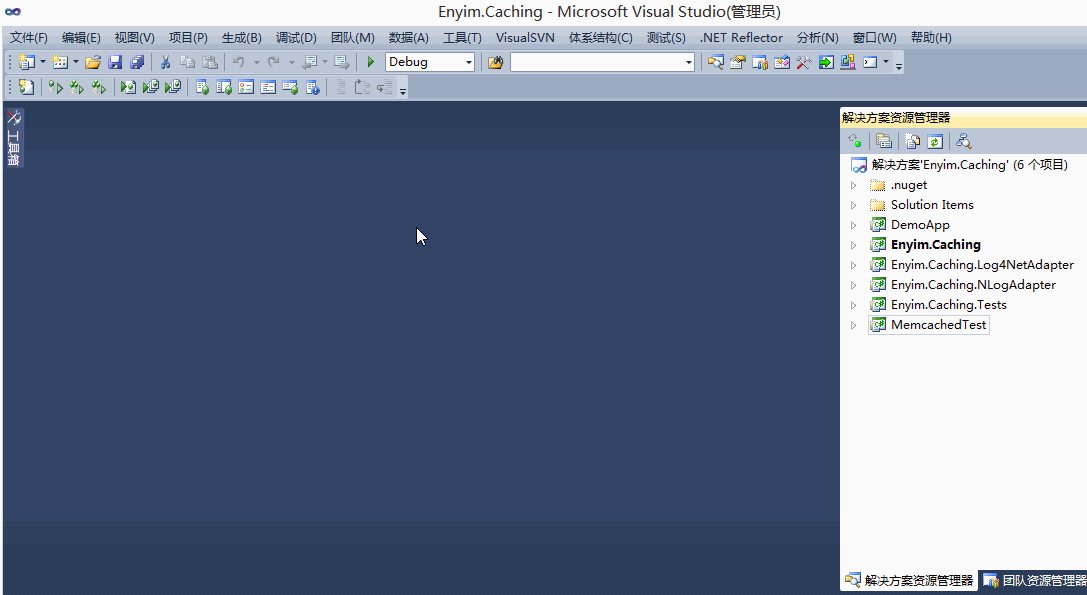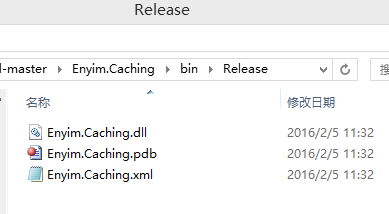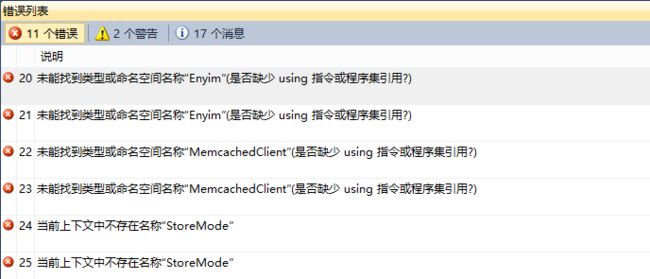#Memcached系列#(6)使用Enyim.Caching访问Memcached的一个C#控制台程序
这篇文章主要是通过Enyim.Caching来完成访问Memcached。
这篇文章标为“原创”,其实,是从多个地方整合过来的内容;但觉得“转载”也不合适,也并不是完全照搬别人的东西。
参考网址(不过,感觉它的配置写的乱糟糟的):http://www.cnblogs.com/luyinghuai/archive/2008/08/28/1278200.html
(1)首先下载EnyimMemcached(文件名:EnyimMemcached-master.zip)。
进入网址https://github.com/enyim ,可以看到如下界面,并选择“EnyimMemcached”
进入如下页面,或者直接访问:https://github.com/enyim/EnyimMemcached,点击右侧的“Download ZIP”,得到文件“EnyimMemcached-master.zip”
(2)将“EnyimMemcached-master.zip”解压出来,如下图
注:我们可以用“*.dll”进行搜索一下,发现并没有Enyim.Caching.dll,所以需要我们自己生成。
用Visual Studio 2010打开“Enyim.Caching.sln”文件
在打开的过程中,我遇到了(好几次)下面的提示,以我目前的水平,还不能确切的明白 “这个提示到底会发生什么事情”,所以我将它忽略了,如果有明白的朋友,可以告诉我啊
直接,我们按一下F6(生成解决方案),会发现如下错误
针对上面的问题,我们可以查看右侧的“解决方案资源管理器”内各个项目的引用信息,发现
-->Enyim.Caching.Log4NetAdaper项目中log4net的引用丢失
-->MemcachedTest项目中nuit.framework、nuit.mocks的引用丢失
对于这个问题,我们可以Nuget来解决一下
再看一下,发现错误更多,如下图,发现原来是“NUit的命名空间没有找到”
再用Nuget解决一下这个NUnit的问题,搜索nunit.mocks,安装一下,再按F6(生成解决方案),发现成功了。
(3)生成Enyim.Caching.dll的Release版本,在Enyim.Caching的Bin\Release目录下找到Enyim.Caching.dll文件
Enyim.Caching\bin\Release
(4)新建一个“控制台应用程序”,将Enyim.Caching.dll放到项目的bin目录下
LearningEnyimMemcached\bin
添加Enyim.Caching的引用
(5)添加一个“应用程序配置文件”,文件名是App.config
App.config中的配置如下
<?xml version="1.0" encoding="utf-8" ?> <configuration> <configSections> <sectionGroup name="enyim.com"> <section name="memcached" type="Enyim.Caching.Configuration.MemcachedClientSection, Enyim.Caching" /> </sectionGroup> </configSections> <enyim.com> <memcached protocol="Binary"> <servers> <!-- make sure you use the same ordering of nodes in every configuration you have --> <add address="192.168.100.85" port="11211" /> <add address="192.168.100.63" port="11211" /> </servers> <socketPool minPoolSize="10" maxPoolSize="20" connectionTimeout="00:00:10" deadTimeout="00:00:10" /> <keyTransformer type="Enyim.Caching.Memcached.TigerHashKeyTransformer, Enyim.Caching" /> </memcached> </enyim.com> </configuration>
(6)Program.cs文件中的代码
如下
using System;
using Enyim.Caching;
using Enyim.Caching.Memcached;
namespace LearningEnyimMemcached
{
class Program
{
static void Main(string[] args)
{
// create a MemcachedClient in your application
// you can cache the client in a static variable or just recreate it every time
MemcachedClient mc = new MemcachedClient();
// store a string in the cache
mc.Store(StoreMode.Set, "MyKey", "Hello");
// retrieve the item from the cache
Console.WriteLine(mc.Get("MyKey"));
// store some other items
mc.Store(StoreMode.Set, "D1", 1234L);
mc.Store(StoreMode.Set, "D2", DateTime.Now);
mc.Store(StoreMode.Set, "D3", true);
mc.Store(StoreMode.Set, "D4", new Product());
mc.Store(StoreMode.Set, "D5", new byte[] { 1, 2, 3, 4, 5, 6, 7, 8, 9, 10 });
Console.WriteLine("D1: {0}", mc.Get("D1"));
Console.WriteLine("D2: {0}", mc.Get("D2"));
Console.WriteLine("D3: {0}", mc.Get("D3"));
Console.WriteLine("D4: {0}", mc.Get("D4"));
byte[] tmp = mc.Get<byte[]>("D5");
// delete them from the cache
mc.Remove("D1");
mc.Remove("D2");
mc.Remove("D3");
mc.Remove("D4");
// add an item which is valid for 10 mins
mc.Store(StoreMode.Set, "D4", new Product(), new TimeSpan(0, 10, 0));
Console.WriteLine("D4: {0}", mc.Get("D4"));
Console.ReadLine();
}
// objects must be serializable to be able to store them in the cache
[Serializable]
class Product
{
public double Price = 1.24;
public string Name = "Mineral Water";
public override string ToString()
{
return String.Format("Product {{{0}: {1}}}", this.Name, this.Price);
}
}
}
}
再按一下F6,发现有11个错误,说是“未能找到Enyim的命名空间”,可是,我已经添加了Enyim.Caching的引用了。
针对这个问题,打开项目的属性,将项目的“目标框架”(由原来的.NET Framework 4 Client Profile)改成“.NET Framework 4”,再按F6(生成解决方案),就成功了。
按F5(启动调试),看到如下结果
(7)上面的代码确实能够运行,但是如果对自己要求更高一些,应该这样写
using(MemcachedClient client = new MemcachedClient())
{
// Store the record
client.Store(StoreMode.Set, "currentTime", DateTime.Now.ToString());
// Retrieve the value
string value = client.Get<string>("currentTime");
}
因为MemcachedClient类实现了IDisposable接口
参考网址:http://deanhume.com/home/blogpost/memcached-for-c----a-walkthrough/62
同样,在这篇文章中,作者也写了一个CacheLayer.cs文件,对MemcachedClient进行了封装(a little wrapper),但是有一个问题需要注意:作者的写的这个CacheLayer.cs类只能够在Northscale的1.4.5版本的Memcached下正常运行。
CacheLayer.cs的代码如下
namespace MemcacheExample.Cache
{
using System;
using Enyim.Caching;
using Enyim.Caching.Memcached;
public class CacheLayer
{
private static readonly MemcachedClient Cache = new MemcachedClient();
/// <summary>
/// Retrieve cached item
/// </summary>
/// <typeparam name="T">Type of cached item</typeparam>
/// <param name="key">Name of cached item</param>
/// <returns>Cached item as type</returns>
public static T Get<T>(string key) where T : class
{
try
{
return (T) Cache.Get(key);
}
catch
{
return null;
}
}
/// <summary>
/// Insert value into the cache using
/// appropriate name/value pairs
/// </summary>
/// <typeparam name="T">Type of cached item</typeparam>
/// <param name="objectToCache">Item to be cached</param>
/// <param name="key">Name of item</param>
/// <param name="cacheDuration">Duration of the cache.</param>
public static void Add<T>(T objectToCache, string key, int cacheDuration) where T : class
{
Cache.Store(StoreMode.Set, key, objectToCache, DateTime.Now.AddMinutes(cacheDuration));
}
/// <summary>
/// Insert value into the cache using
/// appropriate name/value pairs
/// </summary>
/// <param name="objectToCache">Item to be cached</param>
/// <param name="key">Name of item</param>
/// <param name="cacheDuration">Duration of the cache.</param>
public static void Add(object objectToCache, string key, int cacheDuration)
{
Cache.Store(StoreMode.Set, key, objectToCache, DateTime.Now.AddMinutes(cacheDuration));
}
/// <summary>
/// Remove item from cache
/// </summary>
/// <param name="key">Name of cached item</param>
public static void Remove(string key)
{
Cache.Remove(key);
}
/// <summary>
/// Clears all stored objects from memory.
/// </summary>
public static void ClearAll()
{
Cache.FlushAll();
}
/// <summary>
/// Check for item in cache
/// </summary>
/// <param name="key">Name of cached item</param>
/// <returns>A boolean if the object exists</returns>
public static bool Exists(string key)
{
return Cache.Get(key) != null;
}
}
}

